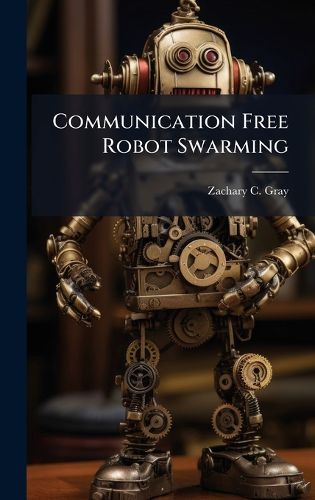Readings Newsletter
Become a Readings Member to make your shopping experience even easier.
Sign in or sign up for free!
You’re not far away from qualifying for FREE standard shipping within Australia
You’ve qualified for FREE standard shipping within Australia
The cart is loading…






As the military use of unmanned aerial vehicles increases, a growing need for novel strategies to control these systems exists. One such method for controlling many unmanned aerial vehicles simultaneously is the through the use of swarm algorithms. This research explores a swarm robotic algorithm developed by Kadrovach implemented on Pioneer Robots in a real-world environment. An adaptation of his visual sensor is implemented using stereo vision as the primary method of sensing the environment. The swarm members are prohibited from explicitly communicating other than passively through the environment. The resulting implementation produces a communication free swarming algorithm. The algorithm is tested for performance of the visual sensor, performance of the algorithm against stationary targets, and finally, performance against dynamic targets. The results show expected behavior of the swarm model as implemented on the Pioneer robots providing a foundation for future research in swarm algorithms.
This work has been selected by scholars as being culturally important, and is part of the knowledge base of civilization as we know it. This work was reproduced from the original artifact, and remains as true to the original work as possible. Therefore, you will see the original copyright references, library stamps (as most of these works have been housed in our most important libraries around the world), and other notations in the work.
This work is in the public domain in the United States of America, and possibly other nations. Within the United States, you may freely copy and distribute this work, as no entity (individual or corporate) has a copyright on the body of the work.
As a reproduction of a historical artifact, this work may contain missing or blurred pages, poor pictures, errant marks, etc. Scholars believe, and we concur, that this work is important enough to be preserved, reproduced, and made generally available to the public. We appreciate your support of the preservation process, and thank you for being an important part of keeping this knowledge alive and relevant.
$9.00 standard shipping within Australia
FREE standard shipping within Australia for orders over $100.00
Express & International shipping calculated at checkout
Stock availability can be subject to change without notice. We recommend calling the shop or contacting our online team to check availability of low stock items. Please see our Shopping Online page for more details.
As the military use of unmanned aerial vehicles increases, a growing need for novel strategies to control these systems exists. One such method for controlling many unmanned aerial vehicles simultaneously is the through the use of swarm algorithms. This research explores a swarm robotic algorithm developed by Kadrovach implemented on Pioneer Robots in a real-world environment. An adaptation of his visual sensor is implemented using stereo vision as the primary method of sensing the environment. The swarm members are prohibited from explicitly communicating other than passively through the environment. The resulting implementation produces a communication free swarming algorithm. The algorithm is tested for performance of the visual sensor, performance of the algorithm against stationary targets, and finally, performance against dynamic targets. The results show expected behavior of the swarm model as implemented on the Pioneer robots providing a foundation for future research in swarm algorithms.
This work has been selected by scholars as being culturally important, and is part of the knowledge base of civilization as we know it. This work was reproduced from the original artifact, and remains as true to the original work as possible. Therefore, you will see the original copyright references, library stamps (as most of these works have been housed in our most important libraries around the world), and other notations in the work.
This work is in the public domain in the United States of America, and possibly other nations. Within the United States, you may freely copy and distribute this work, as no entity (individual or corporate) has a copyright on the body of the work.
As a reproduction of a historical artifact, this work may contain missing or blurred pages, poor pictures, errant marks, etc. Scholars believe, and we concur, that this work is important enough to be preserved, reproduced, and made generally available to the public. We appreciate your support of the preservation process, and thank you for being an important part of keeping this knowledge alive and relevant.